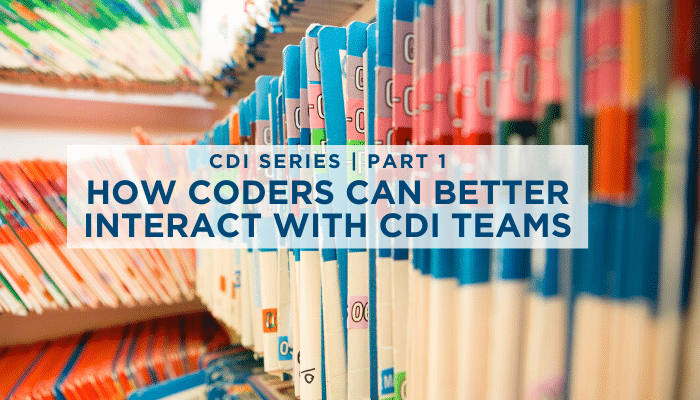This is part one of a three part series in which we address how coders can better interact with Clinical Documentation Integrity (CDI) professionals. Many times these departments are separate and the remote environment makes it difficult to interact efficiently between the two departments. In part one, we will discuss the history and objectives of CDI so the coder has a better understanding of CDI’s role.
How did CDI come into existence?
As you know, accurate clinical documentation is crucial to correct and accurate code assignment. Over the years, coded data has been and will continue to be utilized in many different ways to assess and reimburse health care facilities. The rise of quality measure programs that many times impact reimbursement has increased the need for complete and accurate health record documentation. As a result hospitals have had to develop CDI departments and hire CDI professionals to help improve documentation in a concurrent environment.
Coders have done their part for years in CDI when coding after patient discharge and sending queries to physicians. Before the electronic record, many coders were onsite and able to meet directly with physicians to query a case for diagnostic documentation and to clarify questions. The remote environment has changed that. Some hospitals also employed and still employ coders as “concurrent” coders who do interact with the physicians just as CDI professionals do. However, for the most part, most coders are remote and only interact at times with physicians via post discharge queries
The CDIP’s Role
The CDI professional or specialist provides support of clinical documentation improvement activities in an effort to support the quality an accuracy within the patient’s health record. They also ensure that the coded diagnoses are an accurate reflection of the patient’s clinical status and care. CDI professionals participate in educating medical staff and other patient care team members on documentation guidelines and improvement opportunities. This is done via concurrent record review, medical staff meetings, emails, and one on one interaction. Many CDI professionals are nurses, and many have obtained the CCS credential as well. Most undergo coding training to learn the coding classification and guidelines, but probably do not have the same extensive coding experience as coders do. In addition, coders can be CDI professionals as well. A CDI professional does not always have to be a nurse. A great many coders are CDI professionals and enjoy the daily interaction with physicians. Many have built their clinical knowledge with years of coding experience and university classes in pathology of disease, pharmacology, biology, anatomy and physiology. There are CDI “teams” in some facilities where a coder and a CDI professional are partners on cases. The hybrid team is probably the best arrangement as both disciplines are equally represented.
CDI and Coding
CDI departments and CDI professionals are not going away. Coders and CDI professionals must work together towards the same goal. Remote interaction is typically the venue that these professionals must utilize to interact on cases, since most of the time, the CDI professional and coder are remote. This can pose some problems, especially when “mismatches” occur between the CDI professionals codes and DRG and the HIM coders’ codes and DRG. That is usually when interaction occurs between the two professions.
In part 2 we will discuss “mismatches” and how coders can best interact with CDI professionals when they happen.
The information contained in this coding advice is valid at the time of posting. Viewers are encouraged to research subsequent official guidance in the areas associated with the topic as they can change rapidly.





